FATHER’S DAY
CULTURAL RESOURCES
Sunday, June 17, 2012
Anthony B. Pinn, Lectionary Cultural Resource Team Member
I. Historical Considerations
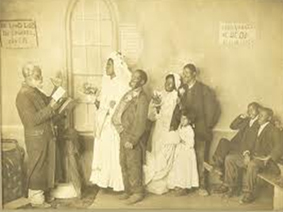 |
Early African American churches were marked by a deep desire to develop and safeguard strong families that lived out the principles of right relationship as outlined in Scripture. These families were to be based on the social model offered by the dominant culture, but churches also thought about this model in light of the damage slavery had done to African American social and familial structures and relationships. These churches sought to correct this damage by assigning all members of the family their particular roles and responsibilities—in line with biblical principles and precepts as African Americans understood them. |
Some offense has been taken with what churches have advocated to the extent these sanctioned roles restricted opportunities for African American women. While rightly challenged in certain ways, some would argue, these sanctioned roles nonetheless have encouraged men to play consistent and strong roles in the nurturing and protecting of families. While there have been disagreements concerning how churches have understood the proper roles of men and women, there is general agreement within African American communities that African American families have faced strong challenges and opposition.
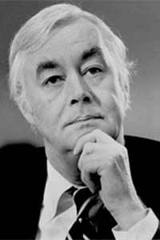
|
In the Twentieth Century, misunderstandings of and problematic conversations concerning African American families persisted through documents such as the report of Daniel Moynihan (pictured here) in 1965 titled “The Negro Family: The Case for National Action,” typically called the Moynihan Report. In this document Moynihan noted the damage done to African American families through ongoing discrimination; but it was also argued in the report that African American family structure—differing from that of most white Americans—was problematic in that it was not uncommon for these homes to be headed by women without the presence of males. Although there were problems with the report, it did rightly point out an issue: the need for African American men to be involved in African American family life. |
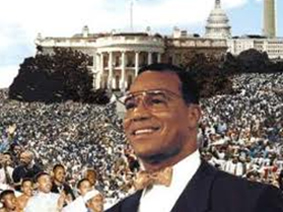 |
Some African Americans have been critical of the failure of African American men to play a prominent role in family structures. One corrective to this situation involved the Nation of Islam’s “Million Man March,” led by Minister Louis Farrakhan (pictured here). During the march African American men acknowledged their shortcomings with respect to family and community obligations, and they pledged to correct their behavior and exercise greater attention to the advancement, for example, of their children through nurture, guidance, and discipline. |
The Nation of Islam was not alone in recognizing the need for this change. (The fact that 2 out of 3 African American children grow up in a house without a male present is difficult to miss.) Many churches also acknowledged this and tried to make a difference through classes and other ways of fostering greater attention to this dilemma. Nonetheless, the need to remind men of their familial obligations, with respect to the raising of their children—including the guiding and correcting of their behavior—is as great as ever.
While so many African American families are marked by an absence of African American men as positive role models, churches should mark out time to celebrate those men who are involved in the life of their family, who do play a significant role in guiding their children, and who understand that correcting poor behavior through discipline is a marker of concern and a parental obligation fulfilled.
II. Biographical Reflection
Numerous news stories have profiled and lamented the failure of some men to behave as responsible and nurturing fathers; instead, they have destroyed life through abuse of their children, and in some instances have gone so far as to kill children. Fortunately such extreme instances of abuse are not the typical situation, and they are countered by examples of men who behave with love toward their children—encouraging them and disciplining, when necessary, with integrity and deep regard.
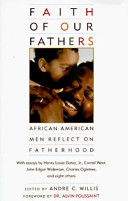 |
Andre Willis provides examples of these good fathers in his book Faith of Our Fathers: African American Men Reflect on Fatherhood (1996). In the book, public intellectuals and others speak to their relationships with their fathers—the moments of promise, the times of tensions, the styles of discipline and communication marking their interaction with the fathers are chronicled. What the book demonstrates is the rich and thick nature of relationships between children and fathers—relationships that dislodge stereotypical depictions of black fathers as disinterested and disengaged. What is revealed are stories of effort—not always successful and easy, but effort nonetheless to be present, to provide guidance, and to make a difference in a paternally nurturing way. This book reminds us that there are so many stories and personal testimonies of those with fond memories of fathers doing there best to be present and to make a difference—sometimes stumbling, and sometimes falling short, but always present and caring, committed to training their children to be decent and caring people. Churches honoring fathers who love and discipline could make use of readings from this book for their Father’s Day worship service, a Bible Study, a Men’s Retreat, a Sunday School lesson, or a Rites of Passage curriculum. |
III. Songs That Speak to the Moment
Love is the bottom line. It is the connective tissue that should be celebrated during this Sunday. Love provides a framing for life. “Color Him Father (Color Him Love)” by The Winstons speaks to the strength and importance of love that fathers shows when they provide for and nurture their children. A Father’s Day classic, it is about a father who shows love for his children by working hard to provide for and by loving them. Enjoy the video that accompanies this song: the lyrics are also provided below.
Color Him Father (Color Him Love)
There’s a man at my house he’s so big and strong
He goes to work each day, stays all day long
He comes home each night looking tired and beat
He sits down at the dinner table and has a bite to eat
Never a frown always a smile
When he says to me how’s my child
I’ve been studying hard all day in school
Tryin’ to understand the golden rule
Think I’ll color this man father
I think I’ll color him love
Said I’m gonna color him father
I think I’ll color the man love, yes I will
He says education is the thing if you wanna compete
Because without it son, life ain’t very sweet
I love this man I don’t know why
Except I’ll need his strength till the day that I die
My mother loves him and I can tell
By the way she looks at him when he holds my little sister Nell
I heard her say just the other day
That if it hadn’t been for him she wouldn’t have found her way
My real old man he got killed in the war
And she knows she and seven kids couldn’t of got very far
She said she thought that she could never love again
And then there he stood with that big wide grin
He married my mother and he took us in
And now we belong to the man with that big wide grin
Think I’ll color this man father
I think I’ll color him love
Said I’m gonna color him father.1
The next song, “Daddy,” comes to us from pop artist Beyonce. The song shows the indelible impressions that fathers can make upon their children—in this case, for good.
Daddy
I remember when you use to take me on a
Bike ride every day on the bayou (you remember that? we were inseparable)
And I remember when you could do no wrong
You’d come home from work and I jumped in your arms when I saw you
I was so happy to see you (I was so excited, so happy to see you)
Because you loved me I overcome
And I’m so proud of what you’ve become
You’ve given me such security
No matter what mistakes I make you’re there for me
You kill my disappointments and you heal my pain
You understood my fears and you protected me
Treasure every irreplaceable memory and that’s why
I want my unborn son to be like my daddy
I want my husband to be like my daddy
There is no one else like my daddy
And I thank you for loving me
I still remember the expression on your face
When you found out I’d been on a date and had a boyfriend (my first boyfriend, you should have seen your face)
I still remember I caught you crying cause of my tattoo
Could have said, “Beyonce, I told you so.”
Instead you said you’d get one too (even my mama said y’all get one just like mine)
Words can’t express my boundless gratitude for you
I appreciate what you do
You’ve given me such security
No matter what mistakes I make you’re there for me
You kill my disappointments and you heal my pain
You understand my fears and you protected me
Treasure every extraordinary memory and that’s why
I want my unborn son to be like my daddy
I want my husband to be like my daddy
There is no one else like my daddy
And I thank you for loving me
Even if my man broke my heart today
No matter how much pain I’m in I will be okay
Cause I got a man in my life that can’t be replaced
For this love is unconditional it won’t go away
I know I’m lucky
Know it ain’t easy
For men who take care of their responsibilities
Love is overwhelming
Can’t help my tears from falling
I love you so much daddy
(Thank you, you’ve done so much for me. I love you daddy.)
I get so emotional daddy, every time I think of you
I get so emotional daddy, every time I think of you
There is no one else like my daddy
No one else can replace my daddy...2
Our final song for Father’s Day 2012 comes compliments of the late, great John Lennon. After admitting that he was not a good father to his first son, Lennon was determined that with his second son, Sean, he would be the best father he could. He wrote this song to express his love to Sean. The sentiments are those of all fathers who love their children.
Beautiful Boy (Darling Boy)
Close your eyes
Have no fear
The monster’s gone
He’s on the run and your daddy’s here
[Chorus:]
Beautiful, beautiful, beautiful
Beautiful boy
Beautiful, beautiful, beautiful
Beautiful boy
Before you go to sleep
Say a little prayer
Every day in every way
It’s getting better and better
[Chorus]
Out on the ocean sailing away
I can hardly wait
To see you come of age
But I guess we’ll both just have to be patient
‘Cause it’s a long way to go
A hard row to hoe
Yes it’s a long way to go
But in the meantime
Before you cross the street
Take my hand
Life is what happens to you
While you’re busy making other plans
[Chorus]
Before you go to sleep
Say a little prayer
Every day in every way
It’s getting better and better
Beautiful, beautiful, beautiful
Beautiful boy
Darling, darling, darling
Darling Sean3
IV. Quotations
My hope for my children must be that they respond to the still, small voice of God in their own hearts.4
A man’s children and his garden both reflect the amount of weeding done during the growing season.5
A truly rich man is one whose children run into his arms when his hands are empty.6
V. Learning from This Moment
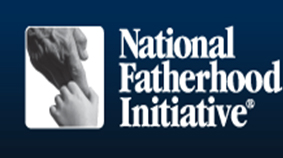 |
Some African Americans have been critical of the failure of African American men to play a prominent role in family structures. One corrective to this situation involved the Nation of Islam’s “Million Man March,” led by Minister Louis Farrakhan (pictured here). During the march African American men acknowledged their shortcomings with respect to family and community obligations, and they pledged to correct their behavior and exercise greater attention to the advancement, for example, of their children through nurture, guidance, and discipline. |
Making certain there are men in homes who provide guidance and discipline requires educating men concerning their responsibilities for the children they produce. The National Fatherhood Initiative, founded in 1994, was established to address this issue. It does so through attention to a set of commitments and insights that include recognition of the unique role fathers play in the development of well-adjusted and capable children and recognition that the absence of a father is linked to a variety of social problems and concerns. The solution is to increase the number of children receiving consistent guidance from a father figure. In line with this thinking, the National Fatherhood Initiative has developed what it references as the “3-E Strategy,” which involves knowledge through education, fostering of organizations equipped to address this issue, and engagement with businesses and other organizations. It does so through online information, public service announcements, interviews, workshops, mentoring, support groups, and other outlets for information that, since its founding, increased by two million the number of children in homes with their fathers.
In addition the organization has trained and equipped scores of organizations to address this issue. It should also be said that many churches take advantage of the information and resources available through this Initiative. What churches have done includes use of the Initiative’s “24/7 Dad Power Hour,” a small group study format that helps fathers understand their responsibilities in light of biblical teachings and codes of conduct. In addition, the Initiative also offers churches guidelines for the development of creative and active Men’s Ministry programs.
VI. Learning More about This Moment
Websites
Books
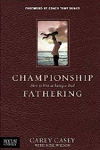 |
Casey, Carey. Championship Fathering. Carol Stream, IL: Tyndale House Publishing, 2009.
|
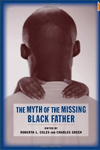 |
Coles, Roberta and Charles Green, eds. The Myth of the Missing Black Father. New York: Columbia University Press, 2009.
|
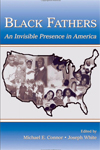 |
Connor, Michael E. and Joseph L. White, eds. Black Fathers: An Invisible Presence in America. Mahwah, NJ: Lawrence Erlbaum Associates Publishers, 2006. |
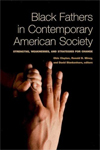 |
Mincy, Ronald, et al. Black Fathers in Contemporary American Society: Strengths, Weaknesses, and Strategies for Change. New York: Russell Sage Foundation, 2003. |
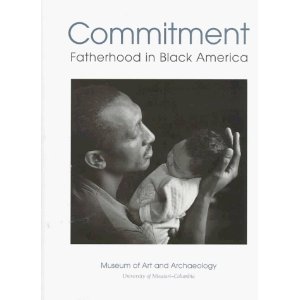 |
Patterson, Carole, et al., eds. Commitment: Fatherhood in Black America. Columbia, MO: University of Missouri Press, 1998. |
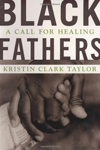 |
Taylor, Kristin Clark. Black Fathers: A Call for Healing. New York, NY: Doubleday, 2003. |
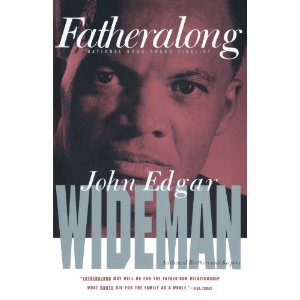 |
Wideman, John Edgar. Fatheralong: A Meditation on Fathers and Sons, Race and Society. New York, NY: Knopf Doubleday, 1995. |
Notes
1. Color Him Father (Color Him Love). Color Him Father: The Winstons. Los Angeles, CA: Fuel 2000 Records, 1969.
2. Daddy. By Beyonce Knowles. Dangerously in Love. New York, NY: Columbia, 2003.
3. Beautiful Boy, Darling Boy. By John Lennon. Lennon Legend: The Very Best of John Lennon. Los Angeles, CA: Capitol Records, 1998.
4. Young, Andrew. A Way Out of No Way. Quote found at http://www.infoplease.com/spot/bhmquotes1.html accessed 19 January 2012
5. Online location: http://www.chiff.com/a/fathers-day-quotes.htm accessed 19 January 2012
6. Online location: http://www.chiff.com/a/fathers-day-quotes.htm accessed 19 January 2012
|